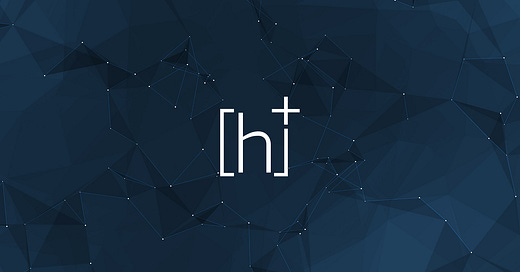DeepMind and OpenAI - The Story of Two AI Labs - H+ Weekly - Issue #404
This week - Meta wants to develop "AI personas"; Elon Musk teases "anti-woke" AI lab; biocomputers made from organoid brains; and more!
The newsletter looks different this week. It is because I moved to Substack. There are still some things I have to address or fix so bear with me. Everything should be working in the next few days.
Please let me know what you think about this change and thank you for your patience. Now, without further ado, let’s jump into this week’s issue of H+ Weekly!
If you would ask anybody to name some AI research labs, chances are two names will top the list - DeepMind and OpenAI. Let's take a closer look at both of them, where they are and what differentiates them.
DeepMind was founded in 2010 in London to be, as founder and CEO Demis Hassabis said, "the Apollo Programme for AGI". DeepMind first got noticed with its AI that mastered old-school Atari games, like Breakout, Pong and Space Invaders. This brought the attention of tech giants. In 2014, Google acquired DeepMind for £500 million.
OpenAI's story began in 2015. It was an interesting moment in the tech world at that time. AI has become noticeable. The hype was real. And the conversation about AI safety started to happen. Just a year earlier, Elon Musk brought the conversation to the front pages when he said that "we are summoning demons with AI". That was the environment in which OpenAI was born.
OpenAI started as a non-profit, independent, open-source research lab with $1 billion in initial investment and with a goal "to ensure that artificial general intelligence benefits all of humanity". In 2016, they released Gym - an environment to develop reinforced learning programs. They played with robotics and taught a robotic hand to manipulate objects. And in 2019, OpenAI Five mastered Dota 2 and beat human players.
Things started to change in 2019. OpenAI transitioned from a non-profit to a “capped-profit” company. This allowed OpenAI to attract investors. One of them was Microsoft, which put $1 billion into the company. A year later, in 2020, OpenAI released GPT-3, kickstarting the large language model age of AI we have now. In 2011, OpenAI released DALL-E, kickstarting the image-generating AI scene. And in December 2022, OpenAI released ChatGPT.
OpenAI has momentum right now. Everyone is talking about ChatGPT. Microsoft extended the partnership with OpenAI, reportedly invested another $10 billion into the company and started incorporating ChatGPT and DALL-E in its products. Many professional programmers use Codex - a code-generating AI - in their work. According to Reuters, OpenAI is on track to generate $1 billion in revenue by 2024. And everyone anticipates the release of GPT-4.
DeepMind, on the other hand, is quiet. So, what's going on?
If you look at DeepMind's website, their about page or check their Twitter bio, you'll notice the emphasis DeepMind puts on advancing science. DeepMind is a company founded and led by scientists.
In the 2010s, DeepMind was going from breakthrough to breakthrough in AI. After their AIs mastered almost all games on Atari, the company started the most ambitious project in their history - to create an AI to master the ancient game of Go. In 2016, DeepMind made history. AlphaGo has beaten Lee Sedol, becoming the first AI to defeat a Go world champion. A year later, they showed AlphaZero - an AI agent that can master any two-player game on its own. In 2019, DeepMind released AlphaStar - the first AI to beat human champions in StarCraft II and the first AI to reach Grandmaster level in the game. And in 2020, DeepMind presented AlphaFold - an AI that solved the protein folding problem, a massive scientific breakthrough for biology and medicine. They also started to apply AI to other fields of science, like pure mathematics. There is also Gato - DeepMind's generalist agent which can reportedly do 600 different tasks, from playing games to captioning images to controlling a robot.
This does not mean DeepMind's research has no applications. They spun off Isomorphic Labs in 2021 to commercialise AlphaFold in drug discovery (nothing new has been heard since then). They applied AI in weather forecasting. But most of DeepMind's work finds its application at Google. WaveNet powers Google's text-to-speech. They worked with YouTube on new video compression algorithms and with Google data centres to reduce cooling costs by 40%.
OpenAI, on the other hand, embodies now Silicon Valley approach of moving fast. OpenAI has investors now. They need to make a profit. So they turn AI projects into products as fast as they can and sell them. I mentioned the deal with Microsoft but they also offer their AI models for third-party developers to build apps and services. OpenAI is turning itself into an AI platform.
Both DeepMind and OpenAI started as research labs taking on the problem of solving intelligence. Over time, OpenAI transformed into a for-profit company while DeepMind remains a research lab.
🦾 More than a human
Human augmentation with robotic body parts is at hand, say scientists
Researchers say human augmentation could be on the horizon, suggesting additional robotic body parts could be designed to boost our capabilities. And as Tamar Makin, a professor of cognitive neuroscience at Cambridge University, says, our brains can quickly adapt to new limbs without any brain chips. “[Of around] 600 people between the age of three and 97, 98% could use it within the first minute, meaning … they could already move objects around as instructed,” said Makin. “I can’t imagine a brain chip that can do that.”
U.S. regulators rejected Elon Musk’s bid to test brain chips in humans, citing safety risks
According to this report from Reuters, Neuralink’s requests to start human trials of their brain implants have been rejected by FDA. Current and former Neuralink’s employees told Reuters there are dozens of issues to resolve before such permission is granted. The major concerns included: the device’s lithium battery; the potential for the implant’s tiny wires to migrate to other areas of the brain; and questions over whether and how the device can be removed without damaging the brain.
🧠 Artificial Intelligence
Meta wants to develop ‘AI personas’
Mark Zuckerberg announced that Meta is creating a "new top-level product group at Meta focused on generative AI to turbocharge our work in this area". Zuckerberg said that in short term, the team will focus on "building creative and expressive tools". For the long term, Zuckerberg teases an idea of "AI personas" that can help users in “a variety of ways” without disclosing specifics.
Fighting ‘Woke AI,’ Musk Recruits Team to Develop OpenAI Rival
The Information reports that Elon Musk is building a team to develop an "anti-woke" alternative to OpenAI's ChatGPT. The rumour is that Igor Babuschkin, a former DeepMind employee, is going to be the chief of the new company.
Keep your AI claims in check, FTC says
You know the hype is real when FTC tells startups to calm down and to make sure their new AI products do not overpromise and underdeliver.
A watermark for chatbots can spot text written by an AI
The latest generation of text generators, powered by large language models, are capable of creating text so good it is sometimes hard to catch it was not written by a human. This has already caused some problems, with education and disinformation being the most cited cases. To deal with this problem, some researchers propose to include in chatbots like ChatGPT a watermark - a set of rules that generate a pattern that is invisible to humans but can be easily detected by computers.
🤖 Robotics
▶️ Slight Optimus Update
During Tesla Investor Day 2023, Elon Musk gave a short update on Optimus - Tesla's humanoid robot. The video shows two Optimus robots building another Optimus. According to Elon, Optimus is "the least understood and appreciated" Tesla product that could be worth more than the car business at Tesla.
Figure Promises First General Purpose Humanoid Robot
A new company joined the humanoid robots scene. Named Figure, the company promises to deliver "the world’s first commercially viable general purpose humanoid robot". Figure does not have a working robot (they only showed renders) but they have a highly experienced team, with engineers who previously work on humanoid robots at IHMC, Boston Dynamics, Tesla, Waymo, and Google X. It might be worth keeping an eye on them.
🧬 Biotechnology
Will brain organoids soon become biocomputers?
In a new paper, researchers outlined how to create biocomputers - computers made not with silicon and transistors but with human neurons. The idea is to grow neurons from stem cells and create a brain organoid - a tiny lab-grown tissue resembling a fully grown organ (in this case, a brain). Then, with the help of AI, this organoid can be trained to do some useful tasks, using only a fraction of the energy modern computers use. Researchers admit the idea is in its infancy and will require years of work.
This Lab-Grown Skin Could Revolutionize Transplants
Scientists created a new way of growing "edgeless" skin for transplants that literally fits like a glove. Proof of the concept was to grow a tiny glove made of skin and transplant it to a mouse. It quickly integrated with the mouse's body. Tissue engineers are confident that new approaches like this one will make it to the clinic. “It's really becoming a question of when will this be available,” says Feinberg, “and not an if.”
H+ Weekly is a free, weekly newsletter with the latest news and articles about AI, robotics, biotech and technologies that blur the line between humans and machines, delivered to your inbox every Friday.
Subscribe to H+ Weekly to support the newsletter under a Guardian/Wikipedia-style tipping model (everyone gets the same content but those who can pay for a subscription will support access for all).
You can follow H+ Weekly on Twitter and on LinkedIn.
Any suggestions or feedback? Let me know at hello@hplusweekly.com or on Twitter at @conradthegray
Thank you for reading and see you next Friday!





